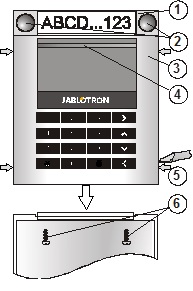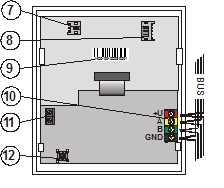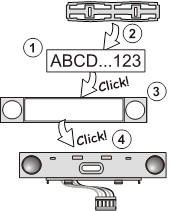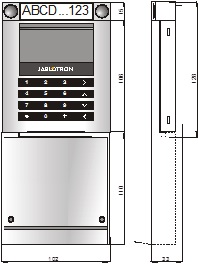Service note for JA-114E Wired code control panel with RFID and LCD Display The control panel is a component of the JABLOTRON JA-100 alarm system. Thanks to its simple system, it is possible to put together a configuration tailored to installation size and user requirements. The product should be installed...
JA-114E
Too much choice? Chat or call us at 085-0160316
There are no products in these categories. Shop on.

Service note for JA-114E
Wired code control panel with RFID and LCD Display
The control panel is a component of the JABLOTRON JA-100 alarm system. Thanks to its simple system, it is possible to put together a configuration tailored to installation size and user requirements. The product should be installed by a trained technician with a valid Jablotron certificate.
The control panel includes a display, RFID reader and the 1st control segment (1). This configuration can be extended by the desired number of JA-192E segments (up to max. 20 per configuration). The hinged cover of the panel (6) can be removed if required, to provide permanent access. The panel also functions as a reader of contactless access cards / tags (RFID).

Figure: 1 - control segment; 2 - segment buttons; 3 - control panel module; 4 - illuminated activation button; 5 - terminals for opening; 6 - screws of cover;

Figure: 7 - connector audio module; 8 - connector control segments; 9 - serial number; 10 - terminal bus; 11 - terminal for through-connection of audio module with the control unit, 12 - tamper switch;
Installation
1. Successively press the four clips on sides (see fig. 1) and detach the control panel from the plastic back panel.
2. When installing the next control segment, first remove the top cover from the 1st segment.
3. Remove the transparent covers from segments (by pulling forcefully on both sides at segment keys).
4. Always connect the guide wire of the segment to the connector of the previous segment and snap them together (it is best to always rotate the guide wires, turning the segment by 360° - this way the wires do not accidentally get caught between the plastic parts). Install all desired control segments in the same way. Finally, replace (snap in) the sealing cap.
5. Pull the cable through the plastic back panel and screw the back panel with segments to the selected position. When using several control segments, also secure the segments against the wall (choose the number of screws as required).
6. Connect bus cable to the connection terminal (11).
For connecting the BUS, the system must be disconnected from the power supply.
7. Connect supply for segments to the internal connector of the control panel (8).
8. Click the control panel into configuration.
9. Continue to follow the instructions for installing the control panel. Basic steps:
a. After switching on, the yellow signal light flashes because the control panel is not assigned to the system.
b. In the F-Link programme, select the desired position on the peripherals map and start learning mode with the Read button.
c. Press the illuminated activation key (4), causing the control panel to learn and the yellow light will extinguish.
10. After assembly is complete, insert description labels into the segment covers and close the covers. Description labels are printed as part of the F-Link programme (card Peripheral devices, at position of the control panel - Internal setting).

Figure: placing description label in the control segment.
Setting properties
This is done by the F-Link programme - card Peripheral devices. On position of the control panel use Internal setting. The present configuration appears, with possibility of setting its properties. Individual segments can be assigned the desired functions (operation sections, signalling state of sections, alarm striking, operation PG output, signalling state PG output, etc.). Details can be found in the F-Link programme.
Change configuration
If the configuration of segments is to be changed, pull them apart at the junction point, on the sides (on the side of the keys).

Technical parameters
Power supply from the bus of central controller (9...15 V)
Current consumption at standby (idle) 15 mA
Current consumption for cable selection 50 mA
Each added control segment 0.5mA
RFID frequency 125 kHz
Range of operating temperatures -10 to +40 °C
Environments according to CSN EN 50131-1 II. indoors, general
Classification grade 2
conforming to CSN EN 50131-1, CSN EN 50131-3,
Further complies with CSN ETSI EN 300330, CSN EN 50130-4,
CSN EN 55022, EN 60950-1
Conditions for operation CTÚ No VO-R/10/09.2010-11
Product has been designed and manufactured in accordance with the provisions to be applied to it: Government Decree No. 426/2000 Sb. in the text of subsequently promulgated regulations, if used according to its intended purpose.
Note: Although this product does not contain any harmful materials, do not dispose of it in the domestic waste, but dispose of it at the collection point designated for electronic waste.
The control panel includes a display, RFID reader and the 1st control segment (1). This configuration can be extended by the desired number of JA-192E segments (up to max. 20 per configuration). The hinged cover of the panel (6) can be removed if required, to provide permanent access. The panel also functions as a reader of contactless access cards / tags (RFID).

Figure: 1 - control segment; 2 - segment buttons; 3 - control panel module; 4 - illuminated activation button; 5 - terminals for opening; 6 - screws of cover;

Figure: 7 - connector audio module; 8 - connector control segments; 9 - serial number; 10 - terminal bus; 11 - terminal for through-connection of audio module with the control unit, 12 - tamper switch;
Installation
1. Successively press the four clips on sides (see fig. 1) and detach the control panel from the plastic back panel.
2. When installing the next control segment, first remove the top cover from the 1st segment.
3. Remove the transparent covers from segments (by pulling forcefully on both sides at segment keys).
4. Always connect the guide wire of the segment to the connector of the previous segment and snap them together (it is best to always rotate the guide wires, turning the segment by 360° - this way the wires do not accidentally get caught between the plastic parts). Install all desired control segments in the same way. Finally, replace (snap in) the sealing cap.
5. Pull the cable through the plastic back panel and screw the back panel with segments to the selected position. When using several control segments, also secure the segments against the wall (choose the number of screws as required).
6. Connect bus cable to the connection terminal (11).
For connecting the BUS, the system must be disconnected from the power supply.
7. Connect supply for segments to the internal connector of the control panel (8).
8. Click the control panel into configuration.
9. Continue to follow the instructions for installing the control panel. Basic steps:
a. After switching on, the yellow signal light flashes because the control panel is not assigned to the system.
b. In the F-Link programme, select the desired position on the peripherals map and start learning mode with the Read button.
c. Press the illuminated activation key (4), causing the control panel to learn and the yellow light will extinguish.
10. After assembly is complete, insert description labels into the segment covers and close the covers. Description labels are printed as part of the F-Link programme (card Peripheral devices, at position of the control panel - Internal setting).

Figure: placing description label in the control segment.
Setting properties
This is done by the F-Link programme - card Peripheral devices. On position of the control panel use Internal setting. The present configuration appears, with possibility of setting its properties. Individual segments can be assigned the desired functions (operation sections, signalling state of sections, alarm striking, operation PG output, signalling state PG output, etc.). Details can be found in the F-Link programme.
Change configuration
If the configuration of segments is to be changed, pull them apart at the junction point, on the sides (on the side of the keys).

Technical parameters
Power supply from the bus of central controller (9...15 V)
Current consumption at standby (idle) 15 mA
Current consumption for cable selection 50 mA
Each added control segment 0.5mA
RFID frequency 125 kHz
Range of operating temperatures -10 to +40 °C
Environments according to CSN EN 50131-1 II. indoors, general
Classification grade 2
conforming to CSN EN 50131-1, CSN EN 50131-3,
Further complies with CSN ETSI EN 300330, CSN EN 50130-4,
CSN EN 55022, EN 60950-1
Conditions for operation CTÚ No VO-R/10/09.2010-11
Product has been designed and manufactured in accordance with the provisions to be applied to it: Government Decree No. 426/2000 Sb. in the text of subsequently promulgated regulations, if used according to its intended purpose.
Note: Although this product does not contain any harmful materials, do not dispose of it in the domestic waste, but dispose of it at the collection point designated for electronic waste.
